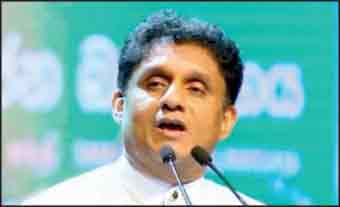Thursday Feb 19, 2026
Thursday Feb 19, 2026
Thursday, 10 April 2025 00:12 - - {{hitsCtrl.values.hits}}
 |
| Opposition Leader Sajith Premadasa |
Opposition Leader Sajith Premadasa yesterday criticised the Government for its inaction on the growing global trend of reciprocal tariffs, warning that the 44% tariff imposed on Sri Lankan exports by the US could significantly impact the country’s economy and debt sustainability.
Raising the issue under Standing Order 27(2) in Parliament, Premadasa questioned why the Government only began addressing the matter after the hefty tariff was already in place, despite his repeated warnings over recent months.
Premadasa also reminded the House that he had previously questioned the Government on 19 February regarding potential fallout from tariff changes initiated by US President Donald Trump. These changes, impacting countries like Canada, Mexico, and China, took effect on 1 February and now threaten Sri Lanka’s export competitiveness as well.
He pressed for clarity on whether Sri Lanka had made diplomatic or Parliamentary inroads in Washington to mitigate the damage, asking specifically if there exists a Sri Lanka-America Friendship Association within the US Senate or House of Representatives.
He demanded full disclosure on the number of members in such an association, their names, and the States they represent, and whether any efforts were made to engage with them.
Premadasa emphasised that both Republicans and Democrats are currently working on joint legislation related to reciprocal tariffs, noting that Sri Lanka must seize the opportunity to build bipartisan alliances in Washington to reverse or reduce the 44% tariff. “US Senators and Representatives have the power to help. But the Government must act with urgency,” he stressed.
He also sought an update on the Government delegation announced in Parliament on 15 March to address the tariff crisis. He requested details about the delegation’s itinerary, the institutions and officials they met in the US, and the Government’s broader strategy to manage the fallout.
Raising broader concerns, Premadasa questioned what measures were being taken to diversify Sri Lanka’s export markets and to attract new Foreign Direct Investment (FDI) as a buffer against protectionist shocks from major economies. He warned that without swift action, the country’s ability to meet its sovereign debt obligations in 2028 could be seriously jeopardised.
In a meeting with the new International Monetary Fund (IMF) representative to Sri Lanka, Premadasa said he had raised these same concerns, stressing that the tariffs could compromise the country’s financial stability and recovery path.
He urged the Government to engage with the IMF and international partners to find a viable, long-term solution.